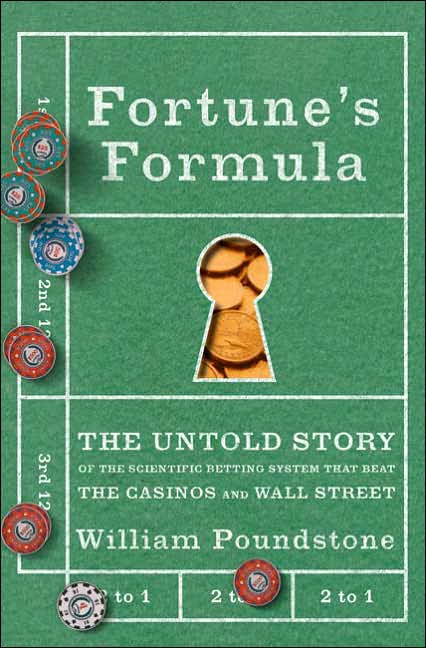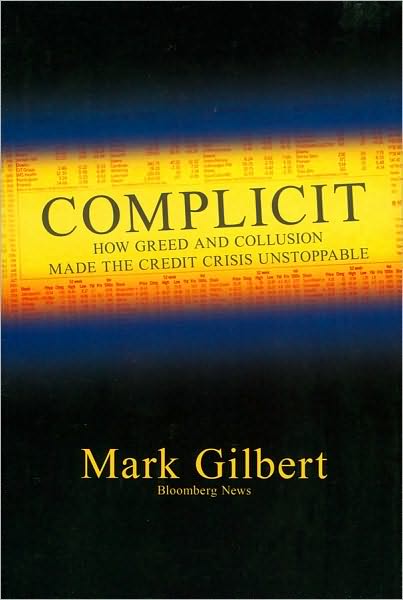Book Review: Fortune’s Formula
When I reviewed the book Priceless, I thought I had reviewed “Fortune’s Formula,” because I had written several pieces on the Kelly Criterion at the blog and at RealMoney (free at TSCM).? But I found that I had not, so I offer you this review of a book I greatly enjoyed:
The book asks a simple question: in making a bet, investment, or business decision, what is the optimal amount of capital to allocate?
But the author, William Poundstone, is not going to give you the answer immediately.? He is going to take you on a journey where you can meet many odd personalities from the ’50s to the early ’00s, and how they came to look at the problem.
Ed Thorp was fascinated with Blackjack, and originated card-counting to improve the probability of winning, to what the card counter had and edge versus the casino.?? He meets John Kelly, Jr. while working together at Bell Labs on Information Theory.? He discovered that an economic actor with an edge could size his bets as a ratio of his edge in? betting divided by the odds received on the bet.
Thorp eventually published a paper, “Fortune’s Formula: A Winning Strategy for Blackjack,” which led to a torrent of interest from gamblers.? With the aid of several backers, Thorp tried out the methods with some success in Reno, with two wealthy gamblers as backers.? That tale was hairy, to say the least, but they more than doubled their money.
Thorp later applied himself to the sleepy market for stock warrants in the 1960s. He developed delta-hedging along with a colleague.? As the book progresses, gambling ceases to be the focus, and advanced strategies for making money on Wall Street with little risk becomes the rule.? And, as in Vegas, as they took steps to lessen the edge in blackjack, on Wall Street competition itself eroded the edge.? But Thorp set up a hedge fund to take advantage of securities mispricing.
One odd sidelight is the number of parties that came up with the option pricing formula known as Black-Scholes, long before B-S wrote their paper.? Life reinsurance actuaries had a version of it in the ’60s, Bachelier had a version of it around 1900. And there were others, but the point was that no one took advantage of the knowledge, except in rough ways, prior to the B-S paper.
Yet option theory could be applied to a wide number of situations, convertible bonds and preferred stocks, even corporate bonds themselves, in addition to warrants and options.? Those that did it early made a lot of money.
A more generalized version of the Kelly Criterion says to focus on the choice that offers the highest geometric mean return.? This led to a conflict with academic economists who insisted the optimal strategy was derived from utility maximization.? What is not disputable is that the Geometric mean will maximize terminal wealth, a result found by Bernoulli and Latane.
The book takes us through financial crisis after crisis, showing how bet sizes were too large relative to the results.? It also takes us to the end where a number of the protagonists end up decidedly wealthy from their attempts to beat the market.
Quibbles
Though Poundstone’s aim is the Kelly Criterion, more of the book is dedicated to finding edges, whether beating the dealer in blackjack, or arbitrage of securities.
If you want to buy the book, you can buy it here:? Fortune’s Formula: The Untold Story of the Scientific Betting System That Beat the Casinos and Wall Street
Who would benefit from this book
Many people would enjoy this book, written in 2005.? Poundstone tells a good story and illustrates how a number of clever men found edges, pursued them, and triumphed.? The reader may not be able to beat the world after reading this, but it may teach him about how bright men found ways to pursue their advantages.
Full disclosure: I bought my copy with my own money.
If you enter Amazon through my site, and you buy anything, I get a small commission.? This is my main source of blog revenue.? I prefer this to a ?tip jar? because I want you to get something you want, rather than merely giving me a tip.? Book reviews take time, particularly with the reading, which most book reviewers don?t do in full, and I typically do. (When I don?t, I mention that I scanned the book.? Also, I never use the data that the PR flacks send out.)
Most people buying at Amazon do not enter via a referring website.? Thus Amazon builds an extra 1-3% into the prices to all buyers to compensate for the commissions given to the minority that come through referring sites.? Whether you buy at Amazon directly or enter via my site, your prices don?t change.







